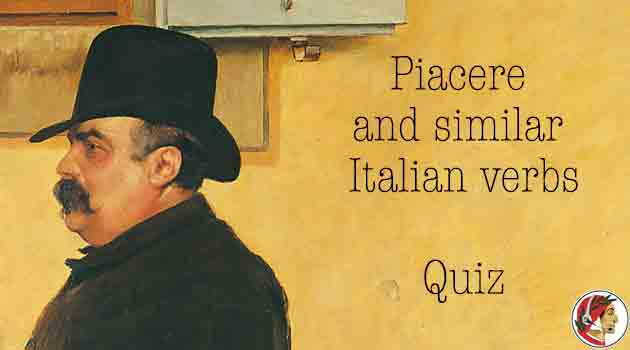Learn how a small number of Italian verbs like “piacere” are different. With a quiz.
I hear this question quite often from my students. How is “piacere” different compared to other Italian verbs? Well, it is quite different. And other important verbs follow the same rules of “piacere”.
I remember I wrote a blog about that a few years ago, but I believe it’s time to put together a more comprehensive guide with a final exercise.
Since “piacere” is one of the first verbs our students see as beginners in their textbooks, I’m going to write this in English. Please feel free to correct my errors.
This lesson though is not just for beginners, since verbs change according to structures of a higher complexity. We’ll see some examples in a minute.
For the sake of simplicity, I will take “piacere” as an example and you can apply the same rules to other verbs on the list later on.
- Mi piace la birra. —> I like beer.
- Mi piacciono i libri. —> I like books.
I’m sure you read a sentence like that when you started to learn Italian. Obviously, you just translated it into your head and put this “mi piace, mi piacciono” somewhere, following your rules, as we all do when we learn a foreign language. Let’s have a second look.
What is the subject here?
Beer and books are subjects of respectively piace and piacciono, not “io”.
- Beer “is pleasing” to me.
- Books “are pleasing” to me.
The structure of piacere is different
What we like or dislike is the subject and the person who likes or dislikes is an indirect object
(mi, ti, gli/le, ci, vi, gli/a loro).
Often times in class, the use of “piacere” is limited to single pronouns, with little attention to plural indirect objects, because we tend to talk about ourselves or about other individuals.
A sentence like “We like you (plural).” translates into:
- Ci piacete.
Capito?
If we break down the pronoun and “stretch” the sentence to a more articulate version, we can reveal the subject and the object:
- Voi piacete a noi.
So, there’s a way to turn the sentence and make it look like a normal, linear phrase, but we (almost) never say it in real life. “Ci piacete” is easier than “(voi) Piacete a noi”, which becomes, by the way, a rather different sentence if we use a stressed pronoun (we like you, and no one else).
Sometimes we really need to clarify who likes what or who, so instead of using a pronoun, we can say:
- A Mario piacciono i dolci.
- Alla mia famiglia piacciono le vacanze al mare.
You can try all different matches of subjects and objects. Of course, native Italian speakers use this model of sentence without realising how complex this sounds to your ears.
Before proceeding further and see other verbs behave like piacere, it’s important to point out that this set of rules has nothing to do with reflexive verbs.
I always hear sentences like “Lui si piace”, which doesn’t mean “he likes”, but rather “he likes himself”. Funny, common, and incorrect.
Let’s try with a compound tense, for example the passato prossimo. We have a safe rule in this case. The auxiliary verb is always essere.
- Vi è piaciuta la cena? – Sì, ci è piaciuta.
- Gli sarebbe piaciuto essere qui.
This one is an example of condizionale composto and retains essere, just as the passato prossimo does. He would have liked to be here, so he’s not here.
- Pensavamo che le piacesse correre.
If you have already studied the congiuntivo, you can figure the meaning of this sentence and the logic behind it. “We thought she liked running”. The verb correre is the subject, while “le” tells us that lei (she) is the person we are talking about. This sentence means that she did not like running. (We thought “running was pleasing to her”)
- Se quella borsa ti fosse piaciuta, l’avresti già comprata.
Again, essere is the auxiliary verb of this periodo ipotetico. This is a congiuntivo trapassato (pluperfect). We can notice that “la borsa” is the subject, not “tu”, by the verb and the feminine piaciuta.
The examples above are just a fraction of all possible tenses and subjects we can use with piacere.
Let’s have a look at other verbs like piacere with different tenses and subjects. I’ll leave the translation to you.
bastare – to be enough
Ti basteranno i soldi per pagare l’affitto?
interessare – to interest
Quando mio padre era giovane, gli interessavano le macchine.
mancare – to miss
Da quando siete partiti, ci mancate molto.
occorrere – to need
Vi occorrerebbero molti giorni per finire quel lavoro.
parere – to seem
Mario mi pare un po’ stupido.
restare – to be left / remain
Credo che ti restino solo 10 minuti di pausa.
sembrare – to seem / look like
Ci sembrate stanchi.
servire – to need
Vi servirebbe il loro aiuto.
succedere
Speriamo che non vi succeda la stessa cosa.
Some of these verbs have a “conventional” structure as well as a version in line with that of “piacere”.
- Stasera restano fuori a mangiare.
- Ci restano solo i soldi per il taxi.
The following quiz contains questions of progressive difficulty. If you are a beginner, give it a try and write down the sentences you don’t understand. Studying this blog will come in handy in future. If you are an experienced student, do your best and try to score more points than the average. Log in if you want to get your score by email.
In bocca al lupo!
–
Vittorio Matteo Corcos: Ritratto di Yorick – 1889








Regarding the quiz: I am having difficulty understanding why one of these sentences uses the subjunctive when the other does not. Can you explain please?
‘Se ti serve una mano, fammi sapere.’
‘Se mi servisse il tuo aiuto, ti chiamerei.’
Thanks
‘Se ti serve una mano, fammi sapere.’
This is called a “periodo ipotetico della realtà”.
If you need help, do let me know.
There’s no doubt or hesitation between the premise and the outcome. We don’t need the subjunctive.
‘Se mi servisse il tuo aiuto, ti chiamerei.’
Right now I don’t need your help, but in case I did, I’d call you.
This is just an open possibility. It could happen, given the condition expressed by the Congiuntivo, but we really don’t know.
We call it a “periodo ipotetico della possibilità”. Congiuntivo imperfetto + Condizionale semplice.
I believe that English Conditional Sentences follow the same logic with less complex grammar.
Ciao
Thank you.
Una lezione eccellente, come al solito, ma forse addirittura migliore.
“on textbooks for beginners” >> “in textbooks for beginners”
Grazie.